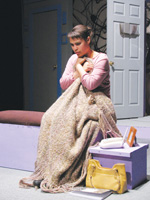home | metro silicon valley index | the arts | stage | review

Photograph by Kit Wilder
Inward: Rachel Davidman plays Kate, one of three women fighting depression in 'Voluntary Amnesia.'
Blues Women
City Lights' 'Voluntary Amnesia' follows three women struggling to break free of depression
By Marianne Messina
USING A SORT of comedy/mystery format, City Lights' world premiere Voluntary Amnesia steers clear of deep grief and slaloms around pat answers as it explores the treatment of depression. Melissa Dylan's play brings together three women suffering from depression in a therapeutic research project headed by Dr. Kurdish (Allison Asher), with oversight from a disembodied Dr. Miles (presumably in an observation booth—voice of Michael Farnia). When we meet the women, who have signed on to this regime of voluntary amnesia in hopes of curing their depression, none knows who she is. Sitting on three Easter-orchid-colored boxes and flanked by three gray, orchid-trimmed doorways, the women begin to rediscover themselves.
A former victim of depression herself, Dr. Kurdish explains that she doesn't believe in the Zoloft/Paxil merry-go-round. Instead, she offers parlor games like "What's in my purse" and "What do I look like in the mirror?" But suspense makes these antics as irresistible as they are contrived, starting with "The envelope please" routine, in which each woman reads a letter written to herself just before the treatment. It's fascinating to watch what each person chooses to tell about herself and to guess at her reactions and then hear objective self-assessments in pronouncements such as "I sound like a very busy person." Probably the strongest impact of the play is how it depicts—sometimes amusingly, sometimes sadly—the way people stray from their more essential selves in creating or envisioning their lives. After the trivia-game group session, the women return home to inhabit lives they don't remember, for a funny, enjoyable Act 2. Though Dylan's characters are recognizable, they're surprising just when you need them to be.
Asher's doctor, very prim in English accent, occasionally corrects her patients' attitudes, especially Sharon's. If this is grounds for Dr. Miles' later criticism of Kurdish, we should be hearing something about it here, but we don't. A perfect blend of disengagement and haughtiness, Diane Milo seems to modulate the play's tone with her scoffing, cursing, cynical Sharon: "I get it; we're all sad, waaaa," she says dully. Playing the pretty, blonde Stanford coed Macy, Robyn Winslow's scene of self-discovery before the mirror is an amusement ride of expressions and reactions. And as Kate, Rachel Davidman makes her grimacy grins welcome as they break out of the flat emotional tone of depression.
Playing multiple roles as members of each woman's life, Lia Fischer, George Psarras and Michael Farnia likely work up a sweat dashing between entrances and clothing changes. Farnia is wildly funny as Macy's cuddle-bunny father with his hug-me hunch, his tickled-pink smile and his thick-rimmed glasses. Psarras smoothly portrays the icy hostility of Sharon's estranged son while making Macy's boyfriend appealing and at ease with himself. Fischer keeps the hilarity in Macy's bubbly bimbo best friend while generating a stifling afterburn that might suggest the roots of Macy's malaise. The Dr. Kurdish/Dr. Miles conflict doesn't really clarify itself until a sort of surprise climax that feels bent and folded into the script. It seems that Dylan wants to seat a current therapeutic approach neatly in each doctor. Miles the unseen opines that psychotherapy can do anything Kurdish's new treatment can do. Kurdish hopes to explore the idea that despite genetic, hormonal and other factors, it is some life situation that flips the depressive switch. It seems rather that her experiment implicates perceptual bad habits like false self-image and high expectations.
Although Ron Gasparinetti's Act 2 set design (with director Nichole Y. Hamilton) is a bit too understated for the homes of these complex women, some of the subtle statements, such as small differences in each woman's doorway, offered humorous insights, enhanced by Brendan Bartholomew's lighting design (Macy brighter, Sharon darker). Also, the final projection was brilliant—images of each woman glowing violet through the back scrim offered a parting postcard to remember them by.
Voluntary Amnesia, a City Lights Theater Company of San Jose production, plays Thursday-Saturday at 8pm and Sunday at 7pm (April 1) or 2pm (April 15), through April 15 (no show April 8) at City Lights, 529 S. Second St., San Jose. Tickets are $20-$35. (408.295.4200)
Send a letter to the editor about this story.
|
|
|
|
|
|